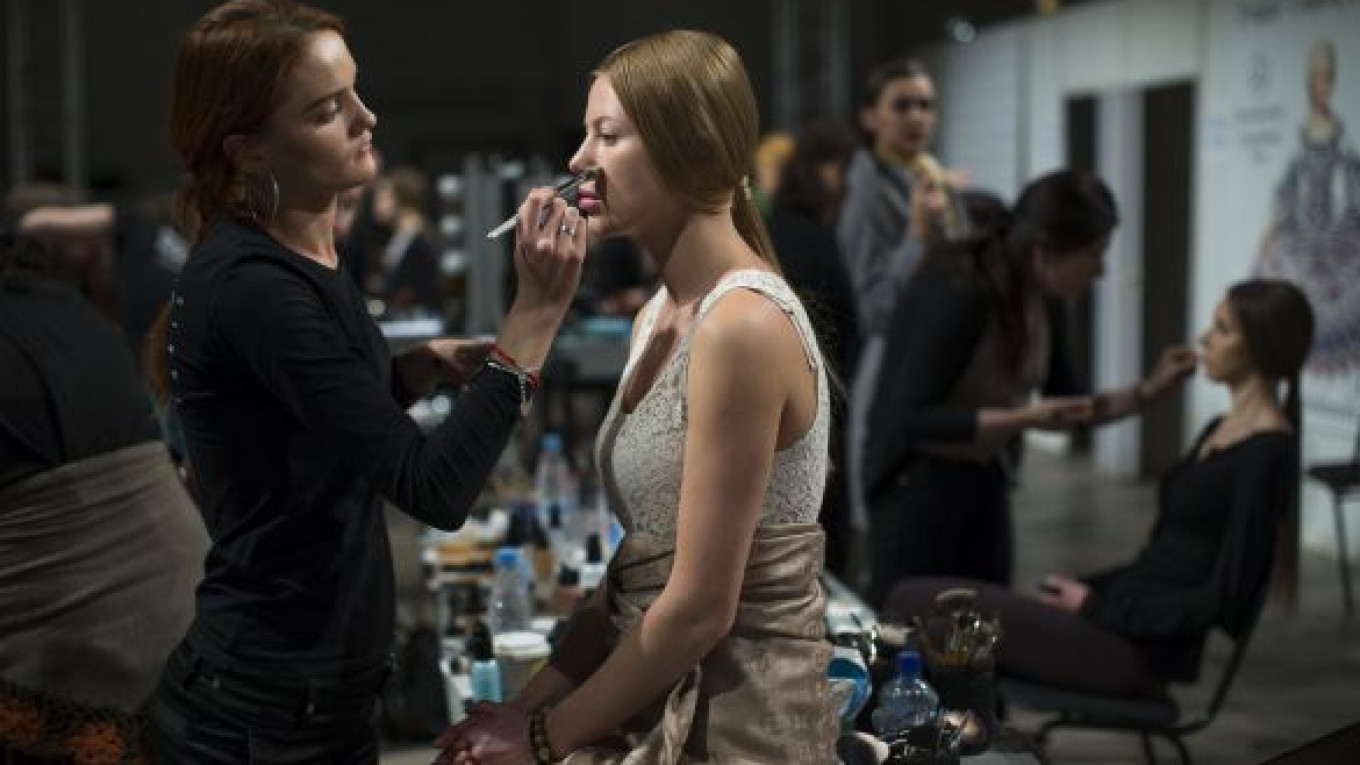This weekend saw the glitz and glamour of Fashion Week Russia descend upon the Manezh. A showcase of Russian creativity old and new, the expositions, films and catwalk shows presented the country as a dynamic new industry with promising future talent at its helm.
But what do those young Russian designers, have to say for themselves about their experiences? Well, in short, that starting up a fashion label in Russia is an uphill struggle.
One of the most talked about new designers Maroussia Zaitseva, who also happens to be the granddaughter of iconic Soviet designer Slava Zaitsev, showed her third collection of minimalist and androgynous silhouettes on Sunday.
"You need to think very carefully and know that this is what you want before launching yourself into this world," she said of her early steps in the industry.
And this is because the industry itself, as so many of the young designers are keen to point out, is fundamentally underdeveloped.
"It's really difficult to break through and get noticed," said Irina Kiryanov of the sister act behind the colorful jewelry brand Rainbow Seekers. "We've been lucky and have become famous quite quickly, but there is a big difference between fame and popularity."
In the age of the Internet when anyone can create a website and market themselves to the world, it seems that this particular bridge between brand recognition and brand loyalty is posing one of the greatest challenges to newcomers. Irina and Marina Kiryanov shrewdly noted that even Fashion Week Russia itself represents a small-scale version of the problems within the industry more generally. There were a lot of people watching the fashion shows, but few actual buyers.
Belarussian designer Dmitry Sholokhov, winner of the 10th season of "Project Runway" and whose stunning collection of sleek, asymmetric designs marched down the runway Saturday, is well-positioned to comment on the shortcomings of getting by on talent alone as a young designer.
"When you are creative and talented, you really need an experienced business partner who can take you to the next level and make you succeed, and there is a definite lack of such opportunity across the former U.S.S.R.," Sholokhov said.
Anastasia Vereshagina, designer of luxurious feminine creations that hark back to "Anna Karenina" and that era of aristocracy and refinement, is also of the opinion that talent is not enough.
"Young designers are hindered more than helped. In our time, it's all about money, not talent. And talent alone is not so tantalizing," she said.
But to argue in the midst of Fashion Week that talent is not being fostered at all would seem to be a contradiction. Many of the young designers who showed their works in the Manezh can undoubtedly be seen as the lucky ones. They are graduates of prestigious fashion schools in Milan, New York, Moscow, winners of televised competitions, interns with existing successful Russian brands and fashion publications, or the progenies of famous designers — a tag that Maroussia Zaitseva incidentally identifies as her biggest challenge as a newcomer.
So why are these platforms for young talent not enough? According to Zaitseva, the industry is suffering from a common misconception.
"There's this stereotype, and I really hope that it's becoming less prominent, that Russians make things badly and that everything imported is better," she said.
For the moment at least, it doesn't seem like things have changed. Olga Kiselenko explained that the problem lies in the conflict between independent Russian labels and the multinational corporations with their mass-produced brands.
This is, of course, a huge obstacle to any hopes of an upcoming fashion industry with Moscow as its capital because so much of the industry is not actually based in Russia and relies heavily on imported fabrics. The new-found independence of the former Soviet republics is one of the factors slowing down the development of successful fashion industries.
"Until 20 years ago these countries were one huge conglomeration and now, all of a sudden, we have all these separate emerging markets and independent nations with their own distinctive cultures and histories, and so it's not one pre-existing, unified industry," Sholokhov said.
Ultimately, the fact that the young designers do not shy away from discussing the challenges facing the fashion industry in Russia suggests at their desire to change the situation. Although realistic about its flaws, all were equally excited to explain why they love Moscow and why it has the potential to become a fashion capital, contending on a world stage with cities like the eternally stylish New York.
"The thing I love about Russian style is that people aren't afraid to dress up," Sholokhov said. "In New York, you'll be at the theater and everyone will be wearing jeans. That just wouldn't happen in Moscow. People really make an effort."
And effort is precisely what this bright new generation of Russian designers are not afraid to make.
Contact the author at artsreporter@imedia.ru
Related articles:
A Message from The Moscow Times:
Dear readers,
We are facing unprecedented challenges. Russia's Prosecutor General's Office has designated The Moscow Times as an "undesirable" organization, criminalizing our work and putting our staff at risk of prosecution. This follows our earlier unjust labeling as a "foreign agent."
These actions are direct attempts to silence independent journalism in Russia. The authorities claim our work "discredits the decisions of the Russian leadership." We see things differently: we strive to provide accurate, unbiased reporting on Russia.
We, the journalists of The Moscow Times, refuse to be silenced. But to continue our work, we need your help.
Your support, no matter how small, makes a world of difference. If you can, please support us monthly starting from just $2. It's quick to set up, and every contribution makes a significant impact.
By supporting The Moscow Times, you're defending open, independent journalism in the face of repression. Thank you for standing with us.
Remind me later.


